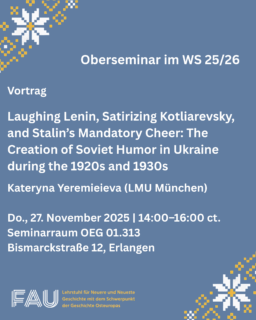Kateryna Yeremieieva: Laughing Lenin, Satirizing Kotliarevsky, and Stalin’s Mandatory Cheer: The Creation of Soviet Humor in Ukraine during the 1920s and 1930s
Datum: 27. November 2025Zeit: 14:15 – 15:45Ort: Bismarckstr. 12, 91054 Erlangen, 1. Stock
Dr. Kateryna Yeremieieva (LMU München): Laughing Lenin, Satirizing Kotliarevsky, and Stalin’s Mandatory Cheer: The Creation of Soviet Humor in Ukraine during the 1920s and 1930s
This presentation explores the construction of Soviet humor in Ukraine during the 1920s and 1930s. This project was influenced not by a formal ban on laughter, but by a growing set of ideological, aesthetic, and emotional norms that defined when, how, and why people could laugh. Humor was expected to be politically loyal, emotionally appropriate, and reflective of national identity, embodying both the revolutionary spirit and the cultural aspirations of Soviet Ukraine.
Bolshevik cultural policy aimed to turn laughter into a pedagogical and ideological tool. Authoritative figures played a crucial role in this process: Kotliarevsky and Shevchenko helped establish a "Soviet Ukrainian" tradition of satire; the image of a laughing Lenin suggested that humor, when properly channeled, could align with revolutionary ideals; and later, Stalin represented a shift towards “mandatory cheer,” where optimism was seen as a sign of political loyalty. The policy of Ukrainization added complexity, necessitating humour that was ideologically Soviet but expressed in the Ukrainian language, form, and cultural references.
At the heart of this discussion is Ostap Vyshnia, known as Ukraine’s “king of print runs.” His immensely popular usmishky (short humorous pieces) illustrated how increasing control and hyper-normativity established ever more stringent rules, leading to what this talk refers to as "Humor Turbulence." This term describes instances when laughter transcended official narratives, highlighting the vulnerabilities of a system that legitimized humor through 'the people,' the Party, and revolutionary ideals. Although the regime sought to suppress such turbulence, its own disciplinary mechanisms inadvertently created it: each new boundary turned humor into a potential source of ambiguity, irony, and unintended meanings.
By the late 1930s, Soviet cultural policy began to more strictly regulate satire—demanding it serve as a weapon of ideology while restricting any forms of humor that ventured outside official control. Consequently, satire existed as both a sanctioned tool and a potential risk, as humor by its very nature continued to create spaces for alternative interpretations and self-expression that could not be suppressed entirely.
Details
Bismarckstr. 12, 91054 Erlangen, 1. Stock

